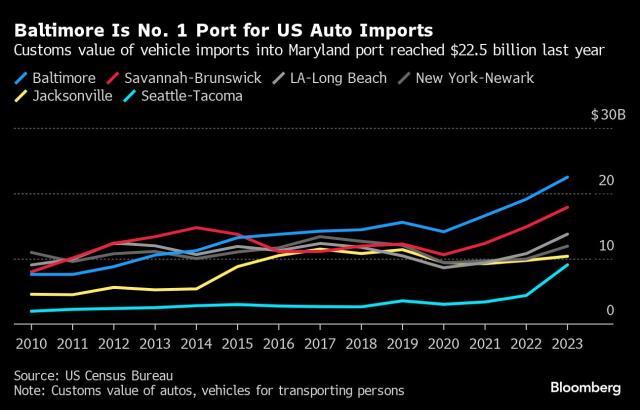The US automotive supply chain will be disrupted by the collapse of the Francis Scott Key Bridge in Baltimore, dealing another blow to America’s automotive ecosystem still recovering from pandemic-related setbacks.

“It’s a large port with a lot of flow through it, so it’s going to have an impact,” John Lawler, Ford Motor Co.’s chief financial officer, said Tuesday on Bloomberg TV. “We’ll work on the workarounds. We’ll have to divert parts to other ports along the East Coast or elsewhere in the country.”
General Motors Co. also said it is working to reroute vehicle shipments that had come through the Port of Baltimore, which is now closed as authorities conduct a search and rescue for those who fell from the bridge. GM said in a statement that it expected “minimal impact” from the port closing.
The disruption comes as automotive inventories are just returning to normal following prolonged shortages of semiconductors and other essential automotive parts during the Covid-19 pandemic. The supply crisis exposed vulnerabilities in the US auto industry, which has relied on a “just-in-time” supply chain that can be broken by the interruption of production or distribution of just a few parts.
“We have experience now in understanding supply chain disruptions,” Lawler told Bloomberg TV. “So we’ll just put that experience to work and figure out the best solution.”
Baltimore for years has been the top US vehicle-handling port, with more than 847,000 cars and light trucks processed through there last year. European carmakers including BMW, Volkswagen and Mercedes-Benz, have set up facilities in and around the port to handle vehicle shipments.

Updated data compiled by Bloomberg shows that so far this month, Mazda had the most auto imports into the US though Baltimore by dollar value, followed by VW, Mercedes-Benz, Jaguar Land Rover and Subaru.
VW said Tuesday its port operations aren’t affected by the collapse because its terminal is located along the seaboard just outside of the bridge, as opposed to inland. Last year, VW received, processed and shipped about 100,000 vehicles through Baltimore for dealers in the Northeast and Mid-Atlantic regions of the US. VW said there may be trucking delays as a result of the accident.
A BMW spokesman said the automaker didn’t expect the bridge collapse to have “any immediate impact on our business, other than short term traffic delays.” Like VW, BMW’s terminal is located in front of the bridge and is still accessible, the spokesman said.
Mercedes-Benz, which has a Baltimore vehicle processing facility west of the bridge, said it is “in close contact with our logistics services providers and are continuously monitoring the situation.” The German automaker added that it has “several options available within our flexible supply chain network.”
Mercedes-Benz sold 298,000 vehicles in the US last year, a decline of 1% compared 2022’s sales.
VW shares closed with a gain of 0.9% Tuesday, BMW rose 0.3% and Mercedes-Benz fell 0.5%.

Follow us on social media: